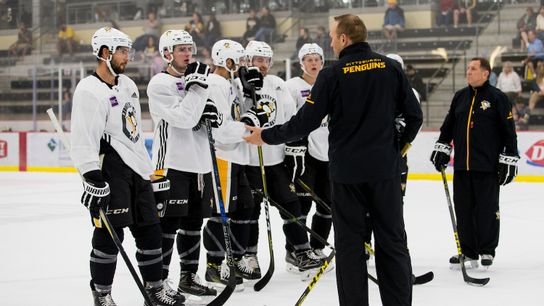SAN JOSE, Calif. — For these Penguins, more than half of whom were born in the 1990s, Sergei Gonchar is simply a 44-year-old assistant coach.
Prior to that, he worked in player development where he earned a reputation for being the team’s 'defenseman whisperer.' Gonchar is widely, and rightfully, credited with resurrecting the careers of, most notably, Justin Schultz, Trevor Daley and Ian Cole — all major contributors to the Penguins’ back-to-back championship teams.
“He’s a guy we love having around and love to learn from,” said Brian Dumoulin, who has blossomed into one of the league’s finest two-way defensemen under Gonchar's tutelage.
But for those who were lucky enough to see him play or, better yet, have him as a teammate, Gonchar should soon have another title, like, say, Hall of Famer.
This summer Gonchar stands a good chance at being elected in his second year on the ballot.
It would be quite a feather in the cap for the Penguins and for Mike Sullivan, who is plotting his own Hall of Fame course as the only coach to win consecutive Cups in the salary cap era. In addition to Gonchar, fellow assistant Mark Recchi was inducted in 2017.
“When I was growing up, Gonch was one of the guys I turned on the TV just to watch him play,” said Jack Johnson, who played against Gonchar and is now coached by him. “I loved his style of play. He’s a Hall of Famer in my book.”
While the Penguins were celebrating the 10th anniversary of their 2009 Stanley Cup championship last week, it’s important to keep Gonchar’s importance to that team in mind. Without him, the Penguins not only don’t win, they might not have even made the playoffs.
After suffering a significant shoulder injury in the preseason that required surgery, Gonchar was sidelined for the first four months of the 2008-09 season.
After making an appearance in the Cup Final a year earlier, the Penguins were skidding along at 27-24-5 in mid-February.
It was at that time that Ray Shero replaced Michel Therrien with Dan Bylsma as coach and the Penguins responded by going on an inspired 18-3-4 run.
Obviously, the mid-season acquisitions of Bill Guerin and Chris Kunitz helped but don’t for a second underestimate Gonchar’s impact.
From serving as the team’s power play quarterback to assimilating Evgeni Malkin, the team’s precocious 22-year-old, Conn Smythe winner, Gonchar was an invaluable player and leader.
The power play, which scored 40 goals over the first 56 games, clicked 22 times in the final 26 games as the Penguins finished second in the Atlantic Division.
In Game 4 of the epic second-round series showdown against the Capitals, Gonchar suffered a partially torn MCL from a knee-on-knee hit, courtesy of countryman Alex Ovechkin. That injury should have taken weeks or months to heal, but Gonchar missed just two games.
The rest, as they say, is history.
Gonchar went on to play six more seasons, retiring at the end of the 2014-15 season.
In his 20 seasons with the Capitals, Bruins, Penguins, Senators, Stars and Canadiens, he recorded 811 points (220 goals and 591 assists), good for 16th all-time and the most by a Russian defenseman.
That’s also more points than recent Hall of Fame inductees Rob Blake and Mark Howe.
Among all defensemen since 1990, only the incomparable Nicklas Lidstrom had more points (985) than Gonchar. Only Lidstrom (98.1) and Brian Leetch (76.6) had greater offensive point shares than Gonchar (76.4), who finished in the top five in Norris Trophy voting four times.
And that’s to say nothing of Gonchar’s silver medal at the 1998 Nagano Games.
Not only was Gonchar prolific, but durable too.
His 1,301 games played are the second-most by any Russian (Alexei Kovalev appeared in 15 more games). In his five seasons in Pittsburgh, ages 31 to 35, he averaged 25:26 in ice time.
Gonchar’s greatest impact though, according to Johnson, is that he — along with Lidstrom — was an innovator for the prototypical modern defenseman.
“Back when he played, there was maybe one or two defenseman on each team that you would label them as puck-movers and could handle the puck well and skate well,” Johnson was saying. “You could put him in any situation. That’s why I watched him and those defensemen, you try to emulate them.”
While most of the players Gonchar works directly with now are all at least 13 years younger than him, at least one of his contemporaries still marvels at Gonchar’s brilliance.
“Definitely, he belongs in (Hall of Fame),” Matt Cullen was saying. “Man, he was a great player in his day and played an awfully long time. Really, one of the beginning of the offensive-defensemen in the way he saw the game.
“And it’s interesting to be around him now and the way he views the game. You see that side of it. You understand why he was so good and understood the game at such a high level.”
MORE FROM PRACTICE
• Justin Schultz skated in a red no-contact jersey at the end of practice. Zach Aston-Reese skated with Schultz without equipment.
"With every day, (Schultz) is getting a little bit stronger," Mike Sullivan told reporters after practice. "We're hoping he's not far off. We're waiting for the doctor to give him clearance to join the team. But he is definitely making progress just from having my own conversations with him. With every day that he skates he feels a little bit stronger, and so my sense is that I don't think it's too far off."
• Here were the lines and pairs used in Monday’s practice. No changes:
Jake Guentzel - Sidney Crosby - Bryan Rust
Tanner Pearson - Evgeni Malkin - Dominik Simon
Riley Sheahan - Derick Brassard - Phil Kessel
Derek Grant - Matt Cullen - Garrett Wilson
Brian Dumoulin - Kris Letang
Olli Maatta - Jamie Oleksiak
Marcus Pettersson - Jack Johnson
Juuso Riikola - Chad Ruhwedel

